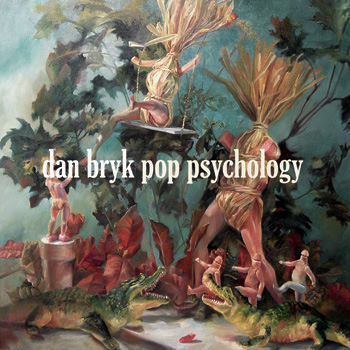Dan Bryk has spent much of his decade-long music career falling through the cracks.
We could go into his run of bad music business luck—major label deals nixed by mergers, collapsing distributors, immigration hassles, A&R guys who “didn’t hear a single,” music scenes that blew up right after he left them—but we won’t.
His new record Pop Psychology pretty well tells the whole sordid tale.
At times couched in romantic metaphor, sometimes directly about the business, or literally even about the music itself, Pop Psychology’s ten original songs (anchored by an obscure Gary Lewis and the Playboys cover) are a musical anthology of mistakes made and lessons learned (maybe), all set to the vibrant soundtrack of Bryk’s classic, impossibly hooky melodic pop.
Tragic, comic, earnest, sardonic, heartbreaking, laugh-out-loud funny – Bryk makes meticulously crafted pop songs out of his musical misadventures yet somehow manages not to take himself all that seriously. His dead serious way with a hook just might keep you humming his failures for days.
Over the course of four albums, Bryk has been labelled “geek rock” and “an-alternative-to-alternative,” accused of writing from a vulnerable, honest perspective more associated with women songwriters like Aimee Mann and Jill Sobule (guilty as charged!) while his earnest, occasionally cracked vocals have brought comparisons to ‘outsider’ artists like Daniel Johnston and Jonathan Richman. At the heart of his not-quite-everyman persona is the universal desire for love and acceptance. It’s just that when Dan Bryk does find happiness, he’s not quite sure what the hell to do with it.
His memorable melodies and pop sensibility have attracted attention from critical quarters as disparate as Pitchfork (“a sparkling pop palimpsest”), The Japan Times (“the greatest pop genius you’ve never heard of”), and Chapel Hill’s Daily Tar Heel (“Bryk’s bright pop-rock tunes deliver youth, insight and humor”). He has received praise from other notable alternative artists like the Eels, Fountains of Wayne and Guided By Voices. CMJ opined that “his ballads are stunning enough to make conversation stop.” Eminent rock critic Robert Christgau rated Bryk’s album “Lovers Leap” an A minus, and has repeatedly called him a “genius” (and he’s not the only critic to lob that particular compliment Bryk’s way).
Self-deprecating to a fault, Dan Bryk doesn’t seem all that impressed. He opens “Whatever,” the pivotal song from Pop Psychology, with the wry offhandedness of a Ray Davies (“Genius is a fucking curse/I’d much prefer property”), before launching into the invective of a young Costello toiling in the vanity factory (“Once my dream of rock was great/of come and prosperity/now I punch the clock and wait/for some asshole’s charity”) and nails it all down with a simple twist on a hoary cliché that manages to be both ironic and earnest: “Whatever doesn’t kill you/can still make you cry.”
If you can tap your toes to that sentiment, you’ll certainly enjoy Pop Psychology.

